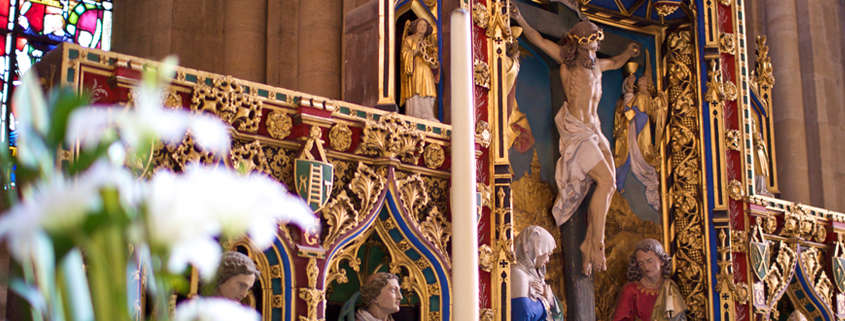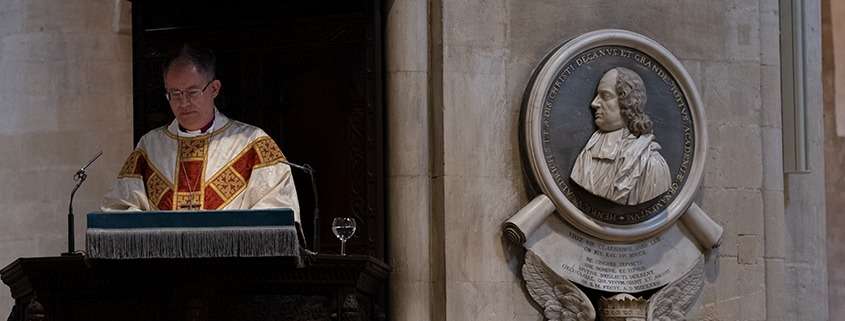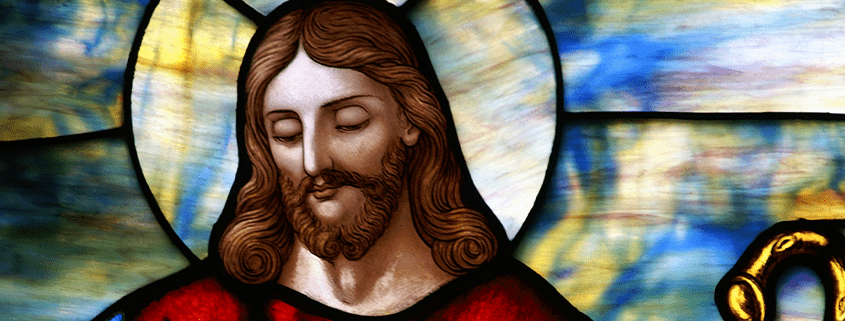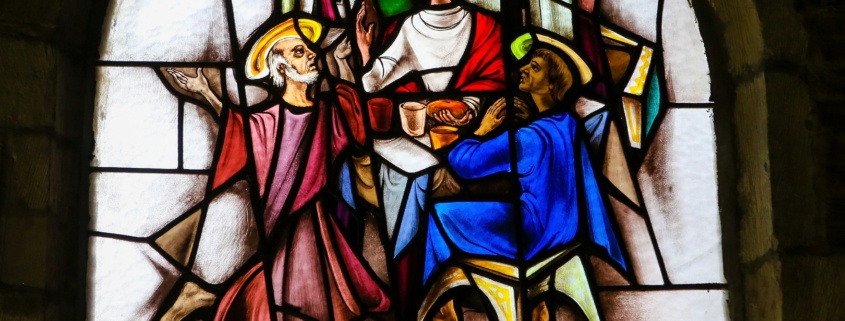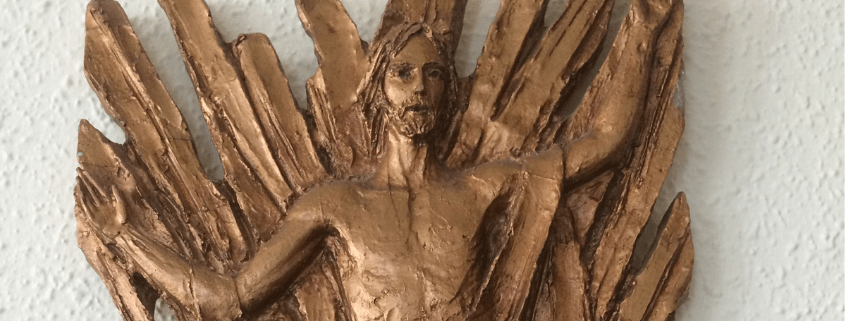This seems a good year to reflect on the emotional depth and range of the Easter stories.
An address from the Bishop of Oxford for the Chrism Mass service, delivered at Christ Church Cathedral, Oxford.
We bear witness to the truth that Christmas has not been cancelled – to the profound truth that God became a human person for our sake.
I hope and trust you’ve had a break in August and that you are coming back refreshed to school or work or ministry – whatever your calling may be.
Today’s readings seem really appropriate as we begin a new school year and as we look ahead to the autumn.
Jesus reminds his followers that the way of the disciple is often a hard way. He talks about his own road to Jerusalem and the way he must suffer and be killed and then rise from the dead. Peter rebukes him: God forbid it, Lord. This must never happen to you.
Then Jesus patiently explains to his disciples that he must walk in the way of the cross – and we must follow him.
If any want to become my followers, let them deny themselves and take up their cross and follow me. For those who want to save their life will lose it and those who lost their life for my sake will find it.
This is a call to deep and adventurous living.
It is also a call to a disciplined life: a way of self denial. Throughout the long history of the church Christians have been called to deny themselves, to live that disciplined life. It can be helpful sometimes to gather those disciplines, those habits, together into a personal code of practice, sometimes called a Rule of Life.
You may never have thought about a Rule of Life for your own Christian journey. This might be a good time to reflect on that and reflect on it with others. Or your Rule of Life might need some resetting at this point in the journey and after several months of lockdown.
What kind of things might be in it? Public worship first of all. Putting God first on the first day of the week, the day of resurrection. If you can, if it’s safe to do so, worship with other Christians. Receive the sacrament. If you can’t for health and safety reasons, or because your church can’t open yet, then worship as you can, virtually. But reset that discipline.
Private prayer next. Set some time aside daily for prayer. It may be helpful to join with others and join your prayers in some way with the prayer of the church. Many churches have reported a rise in the number of people praying together in the mornings and the evenings online. I hope that will continue.
Third, practice the discipline of secret giving to and through the local church and for the relief of those in need. Again, you might need to reset that discipline and the way you give because of the pandemic.
After public worship, private prayer and secret giving, how will you engage in community with others in the Church? We all need the fellowship with other Christians: to rejoice with those who rejoice and weep with those who weep, as Paul writes in that beautiful passage from Romans. Can you meet physically and regularly with a few people to support one another in prayer? If not physically, can you meet virtually, once a week or once a fortnight to recharge your spiritual batteries, to give and to receive, to love one another?
Finally, how will you offer your time and your gifts to serve your wider community and your church? There is so much that needs rebuilding now. We all have something we can give through our time and our talents. Can you support your local school? Can you get involved with a struggling charity? Can you help to rebuild a ministry in your local church? Is there a need to lead in your community? Can you show hospitality and welcome to strangers and build up your neighbourhood?
All of these things are needed and vital. They might feel like a sacrifice at first, but actually, the more we do them, the more connected we feel to others.
A Rule of Life is a very simple thing: a set of habits and disciplines to make sure we are being faithful and being sustained as we follow Christ. Public worship, private prayer, secret giving, fellowship with others, loving service according to our gifts. Think about what you will do. Pray about these disciplines. Write them down. I look forward to walking with you and walking with Christ through the coming year.
What’s your favourite story in the gospels? It’s a question I like to ask when I visit churches for informal meetings. Time and again, over the years, the story that comes to the top of the list is today’s bible reading: the feeding of the five thousand. I wonder if it’s yours.
It’s a story that begins when Jesus and the disciples are exhausted and they need to get away – a good story for the beginning of August. Jesus withdraws by boat to a deserted place. But the crowds follow him, thousands and thousands of people.
Jesus has compassion on them and heals the sick. We love Jesus for his humanity. We love that he is exhausted and we love that he puts his tiredness aside for the sake of the crowds.
At the end of the day, the disciples try to take over and manage the situation. We might have done the same.
“Send the crowds away so that they might go into the villages and buy food for themselves”. But Jesus gives his disciples a seemingly impossible challenge. “They need not go away. You yourselves give them something to eat”. The problem is set.
The disciples look around at the vast crowd. Five thousand men with women and children. There is nothing for miles around. They see the sun beginning to set over the western hills. They look at one another.
Their response is a curious mixture of honesty and hope.
We have nothing here….that’s the honesty. We have nothing here but….five loaves and two fish. Did you hear the but? That’s the hope.
Every authentic call of God has that curious mixture of honesty and hope: it’s that mixture which takes us away from ourselves and draws us into God.
We have nothing here but….five loaves and two fish. This is why we love this story: because we see it lived out in the life of the church year by year.
We look at the vast needs in the communities around us. We see children going hungry. We hear Jesus say: you yourselves give them something to eat. We say: “We have nothing here….but maybe we could start a foodbank, or a breakfast club, or a meals service for the shielding”.
We look at the financial needs of our churches. We say, truthfully, we have nothing but perhaps we could give something extra because the needs are so great.
We look at the children and young people of our churches who need loving and caring for and teaching the faith. We have nothing ….but if there’s no-one else, I could offer the little I do have.
We look at the vast needs in the world in the Disasters Emergency Appeal. We have nothing to match that need. But we could text and give £10.
We see our local church has no Wardens or treasurer. We have nothing it seems – but I could offer some of my spare time in retirement.
Jesus takes five loaves and two fish, the little we have, sincerely offered. Jesus gives thanks. He breaks the bread and gives it to the disciples. The disciples give it to the crowds. A miracle happens. And all ate and were filled.
Every Eucharist, every service of Holy Communion, is a sign and a re-enactment of this story. The priest takes ordinary bread and wine, offered by God’s people. The priest gives thanks, breaks the bread and gives it to the disciples. All are fed by the very bread of heaven, the presence of Christ.
And then, at the end of the service, we offer our very lives to God, all that we have. God takes what is offered and turns it into a miracle.
We have nothing here but five loaves and two fish.
Amen.
The Very Revd Prof. Martyn Percy: Dean of Christ Church, Oxford gave the following sermon during our Church at Home online service on the Sixth Sunday of Easter, 2020
‘If you love me, you will keep my commandments. And I will ask the Father, and he will give you another Advocate to be with you for ever. This is the Spirit of truth, whom the world cannot receive, because it neither sees him nor knows him. You know him, because he abides with you, and he will be in you. I will not leave you orphaned; I am coming to you. In a little while the world will no longer see me, but you will see me; because I live, you also will live. On that day you will know that I am in my Father, and you in me, and I in you. They who have my commandments and keep them are those who love me; and those who love me will be loved by my Father, and I will love them and reveal myself to them.’ – John 14:15-21 New Revised Standard Version, Anglicised (NRSVA)
“I Will Not Leave You Orphaned; I Am Coming To You”
Fifty years ago, one of my favourite films was released. It is a movie for all ages, and has enjoyed enduring popularity. The year was 1970; the film is The Railway Children. I remember going to see it at the Crosby Odeon with my grannie. I loved the film for several reasons. Jenny Agutter, naturally! And Bernard Cribbins, playing the genial role of Perks, the railway-worker.
The Railway Children concerns a family who move out from London to a house in the shires near a railway. Their move was forced upon them, after the father – an intelligent, high-ranking civil servant – was unjustly imprisoned for espionage, but is eventually exonerated.
In their new environs, the three children – ‘Bobbie’ (Jenny Agutter), Peter and Phyllis – befriend an older gentleman who normally takes the morning train from near their home. He becomes an unlikely hero, for in his empathy for the children, is moved to help prove their father’s innocence, thereby reuniting the family. Before the father is freed, however, the family care for a Russian exile who came to England looking for his lost family. And the railway family also take in Jim, the grandson of the old gentleman.
For a good part of the film, the children are effectively orphaned. The climax is achingly beautiful. The train pulls in and stops, and Bobbie, alone, stands on the platform and waits, not knowing if her father is there. The entire scene is consumed in the steam and smoke of the locomotive. And out of the clouds, the father emerges. As the gospel has it today: “I will not leave you orphaned; I am coming to you.”
When we think of orphans, we instinctively think of children without parents. In fact, the English word ‘orphan’ comes from the Greek orphanos, meaning merely ‘bereaved’, ‘bereft’ or ‘deprived’. In English, it has come to signify a child losing one or both parents. Of course we are always somebody’s child. Unless we predecease our parents, we will all know what it is to be orphaned: to be without our father or mother. We can be an orphan at any age.
This pandemic has so far led to over 30,000 deaths in our land, and that number will continue to climb. That means there are hundreds of thousands of new orphans today; and a great many more family, friends and colleagues are also sadly bereft. We only understand the gift of who we truly loved when we experience their loss.
So on this Sixth Sunday of Easter, we wait for another loss, even after the crucifixion. For after the resurrection of Jesus comes the Ascension. He leaves, and returns to the Father. The disciples will bereft once more – orphaned. Yet the scriptures promise us an end more like The Railway Children.
In the gospels Jesus refers to the Holy Spirit as “the Comforter”, and it is this name that most closely associates the maternal and paternal comforting care that Jesus gives – so abundantly in his ministry – with what is to come after he has gone. The gospels record Jesus saying “do not worry” or “do not be afraid” over and over again. Seventy times, in fact. Yes, seventy.
Jesus says it a lot. Don’t be afraid of the storm, or of sinking in this boat. Do not worry about lack of food or clothes. Do not worry about those who hate you. Do not worry about death. “Do not be afraid…I am with you”, says Jesus. Time and time again.
As a child, I grew always knowing I had been adopted. It has had, and continues to have, a profound influence on my personhood, ministry and theology. Deeply imprinted in my soul and psyche is the knowledge that, though I was, literally bereft as a baby, I was not in fact abandoned. I was blessed with good and loving parents, who came for me, and took me home. Interestingly, another meaning of the word ‘orphan’ is quite general – ‘to change allegiance; passing from one status to another’. That was my experience. My status moved from being an “unwanted baby” to becoming a much-cherished, much-wanted, much-loved…son.
Many years later, as an adult, my parents told me that, in fact, I had never been “un-wanted”. My birth mother simply could not keep me. But she had held me for the first weeks of my life, and only gave me up when she handed me over, in person, to the couple that came for me – my parents. My ‘new normal’ was to learn that I had always been held and cherished.
The first Christians cared for and cherished orphans. The scriptures give many examples of infants being adopted and raised by folk that are not their biological parents. The early church was called to be an adopting, caring and comforting community for everyone – especially the neglected, marginalised and bereft. The words Jesus speaks to us are what he calls us to proclaim and practice to the rest of humanity today: “we will not leave you orphaned or bereft; we are here for you; we are coming to you; do not be afraid; God never leaves any of us.”
So what of here and now? I recall an NHS advertising poster some years ago to recruit new nurses. The advert pictured a nurse cradling a new-born baby, and the caption read: “the first few minutes of life can be critical”. But someone had daubed a bit of graffiti underneath: “…and the last few moments can be a bit dicey too.”
This is a fearful, tender time in our nation. Cradling, holding and caring for others at the beginning and end of life – and for all that bit we call “the middle” (perhaps three-score-years-and-ten?) – is where our calling as the church must be. Remembering the words of Jesus, which have been, are being, and will be fulfilled: “I will not leave you orphaned or bereft; I am with you. Do not fear. I am coming to you.”
Alleluia, Amen.
Archdeacon Jonathan gave the following sermon during the Church at Home online service on Sunday 10 May.
75 years ago this weekend the western world was celebrating Victory in Europe. This was news that signified relief, release and recovery: relief at no more casualty notifications from the front-line; a release of exuberant emotion at the cessation of hostilities, and the hope of freedoms recovered. Bonfires, dancing and parties erupted spontaneously across the country. The war was won; we could dream again! Yet just below the exhilaration lay something more bitter-sweet, with many exhausted by the strain of six long years of war memories of loved ones lost in the conflict and rejoicing put on hold for those still caught up with the war in the Far-East. Celebration quickly turned to reflection, for we knew deep down that life was changed – so many questions: how would society be rebuilt and what would it look like for me and my family?
Such a jumble of emotions and questions are common in times of heightened awareness, at pivotal moments in our lives. I’ve observed this myself working alongside servicemen and women on operational duties, and in their loved ones back at home, when what is secure and familiar is no longer certain. You may sense this yourselves in the complex new world created by Covid-19. Jesus’ disciples are no different to us in this respect. In our Gospel story, the level of tension is high. The disciples are trying to get their heads and hearts around all that Jesus is saying and doing. Talk of Jesus being killed yet glorified, of betrayals and denials, and then experiencing this great servant leader stooping to wash their feet and calling them to love others as he has loved them. It all seems a bit overwhelming – to put it mildly.
So what a beautiful gift it is to know that Jesus understands us – completely – and is able to calm our hearts and inspire our minds: “Do not let your hearts be troubled. Trust in God. Trust also in me. There are many rooms in my Father’s house…I go and prepare a place for you.” Perhaps some of us are like the disciples, needing to hear that comfort and reassurance of Jesus in our own circumstances? Jesus, the Son of God and the Son of Man, one with the Father, is uniquely able to bridge Heaven and Earth, Eternity and the Present Day: “I am the Way, the Truth and the Life”, he says, “No-one comes to the Father except through me.” So, whatever our uncertainties about the way ahead, whatever the lies that we may have received or perhaps given, whatever the destructive patterns within or around us, Jesus offers a radical and lasting alternative in himself!
And with that relationship come two gifts come from this relationship: firstly, the promise of eternity that cannot be shaken by any unforeseen circumstances – this brings a whole new dimension to ‘We’ll Meet Again’ – and secondly, an invitation to work with Jesus in uniting heaven with earth today. “Anyone who has faith in me,” he says, “will do what I have been doing…so that the Son may bring glory to the Father.”
It follows that we believe both in life after death – but also in life before death, as the strapline of Christian Aid puts it. Christian Aid was born into the social and economic vacuum that followed the Second World War, with western finances in disarray and a wave of refugees sweeping across Europe. In response to Jesus’ great commands, both to love God and to love our neighbour as ourselves, over 75 years its work has expanded to bring humanitarian relief and development across the globe. It has educated succeeding generations on the causes of poverty and advocated for countless victims of injustice, those without a voice. So the need to support this ministry has arguably never been greater, for those poorest are always most vulnerable to dwindling financial resources and changing climate.
It takes courage, of course, to represent Jesus in speaking and acting for truth. In our first reading it led to martyrdom for Stephen, as he encountered fiercely defended interests, even religious ones. But in standing up for those on the margins we fulfil the call of Jesus, a Kingdom call, living with the promise of life after death and sharing his invitation to life before death. It is humbling to see this lived out across the Diocese of Oxford, as online Alpha courses and school assemblies, for instance, go hand in hand with compassionate Christian service in neighbourhood food banks and key working environments.
75 years from the Second World War we again live in pretty strange times. Contemplating the gradual lifting of lockdown, whole societies, even the Church, are facing uncertainties about the future, concerning health and housing, employment and family life, patterns of church life. As disciples of Jesus, sharing his saving love and establishing his Kingdom on earth, let us take heart that he remains ‘the Way, the Truth and the Life’.
The Venerable Jonathan Chaffey CB
10 May 2020
You can watch the full service here and donate to Christian Aid Week online here.
The Venerable Judy French, Archdeacon of Dorchester, gave the following sermon during our Church at Home online service on Sunday 26 April: A Reflection for Easter 4 Acts 2:42-end; Psalm 23; John 10:1-10
Today is unofficially known as ‘Good Shepherd Sunday’ in the Church’s calendar, because on this 4th Sunday of Eastertide there is always a reading from part of John’s Gospel Chapter 10, in which Christ says, ‘I am the Good Shepherd’. It’s a very well-known and well-loved picture of Jesus, and brings to mind someone who will guard and protect us, care for us and know us each by name, who will lead us to good pasture and back home again to safety, who will come looking for us when we are lost. And that’s reinforced by the words of Psalm 23, which we’ve being praying together every day during the lockdown – the Lord is my Shepherd, he shall refresh my soul. It’s an image woven into the biblical story of God’s relationship with his people, as shepherd and flock.
In today’s Gospel, Jesus tells a little story about a sheepfold and explains the difference between those who hop over the wall to do a bit of sheep-stealing, and the one who enters by the gate and knows every sheep by name. One lot are thieves and bandits and absolutely not to be trusted, and the other is the shepherd who can be trusted to look after the sheep. So far, so good. The message is that we have to listen to the voice of the shepherd who will look after us, and not the thief who wants either to kill and eat us or sell us at the market for his own profit. Make of that what you can. Jesus first focuses attention on the relationship between the shepherd and the sheep, because that is fundamental to what follows; it is crucial for the life and well-being of the sheep, and indicative of what Jesus will do for them, ultimately. But even given the familiarity of the image for his hearers, they don’t understand what he’s talking about or why it’s relevant.
And then just as we are expecting Jesus to say he is the Good Shepherd, which brings to mind all sorts of traditional childhood pictures, he says instead, ‘I am the gate for the sheep’. A gate is not a very rosy or sentimental image. It is practical. It is the shepherd, lying across the entrance to the sheepfold, to guard and protect. It is a way in and a way out; it enables a keeping together in one place and separating, the sheep inside from the dangers outside. Jesus said, ’I am the gate. Whoever enters by me will be saved, and will come in and go out and find pasture. The thief comes only to steal and kill and destroy. I came that they may have life, and have it abundantly.’ And there’s the point of the story: it’s not about security, it’s about abundant life.
It’s particularly poignant in our current context when our coming in and going out is restricted, and what we do and where we go has the potential to affect the life and health of others. This is life, but not as we know it. In a very short space of time, we are having to learn new ways of living and worshipping and working. We may have mixed feelings about the lifting of restrictions: a longing for the freedom of movement we once had; some loss of confidence about our safety and that of those we love if we go out; anxiety about the economy, businesses, and livelihoods; a fresh emerging vision of doing things differently as we emerge from this, particularly in terms of family life, working patterns, church life, the climate emergency. Both during the lockdown and as we emerge from it, we are first disciples of Jesus; we come and go and engage with the world around us, whether at home or in our communities, through listening to the voice of the shepherd, the one who leads us and offers abundant life.
In John’s Gospel, the story of the sheepfold is told in the context of Jesus healing the man born blind, which takes up the whole of the previous chapter. By the end of that story, the man is thrown out of the synagogue by the religious leaders who don’t accept that Jesus is from God. But the man who now sees, recognises and believes in Jesus, and becomes his disciple. Jesus follows that life-changing encounter with the story of the sheepfold and contrasts exclusion and inclusion, death and life. We read this story in the light of Easter and resurrection, and it is significant too that what follows is the raising of Lazarus and Jesus’ own journey to the cross, as the shepherd gives his life for the sheep. ‘I have come that they may have life, and have it abundantly.’
Over the last six weeks or so, our homes have become not only places of home-schooling, work, and family life, but also very intentionally places of prayer and worship. Church at Home, church online, our own times of prayer and reflection, have become ways in which we are focussing, probably more than we did before, on listening to the voice of the shepherd. Doing and being church online is so new for many of us, and as our online presence grows, we are beginning to ask what ‘church’ will look like when the lockdown lifts, and we can return to our church buildings. What’s the exit strategy? We don’t yet know what that looks like for the country or for the church. What will be the ‘new normal’? How do we go forward with a ‘mixed-mode’ church? How do we grow our regular congregations alongside our new online worshipping communities? There is a sense that God is doing something new, and that is exciting, but it’s also unsettling because we don’t know what the future looks like; we are out of our comfort zones. It feels like we really are putting out into deep water, to use another metaphor. If we take our cue from the Gospel today, we will best meet whatever comes next by keeping on listening for the shepherd’s voice, keep returning to the one we trust, who knows us by name and leads us, the Lord who is our Shepherd, who restores and refreshes our souls.
Amen.
Bishop Colin gave the following sermon during the Church at Home online service on Sunday 26 April
Whilst there are a lot of negatives about the current lockdown, and I wouldn’t want for a moment to minimise the difficulties, whether mental, social, financial or relational, that so many are living through, there are nevertheless some silver linings around as well.
For me, one of those is the walks I am managing to make almost every day. It’s hard now to believe that I’ve lived here almost twenty years and that I hadn’t discovered the delights of Bladon Heath with its wonderful bluebells and Roe and Muntjac deer, or the superb views from Spring Hill, up above Begbroke, looking out both over the dreaming spires of Oxford and giving a glimpse of almost all the deaneries of the Dorchester Area – which is a great incentive to pray for them.
Of course, the weather has also been a great help and the sunshine of the last week was fantastic. I can feel a lightness in my step when it’s warm and when there’s a wind behind me. All very different when it’s cold and wet, and there’s a gale blowing in the wrong direction. Then it’s more a case of forcing one foot after the other.
Imagine for a moment watching Cleopas and his friend walking along the road from Jerusalem to Emmaus. Those seven miles, something over the 10,000 steps so beloved at present, must have seemed very long ones indeed. Even if much of it was downhill, I doubt very much if there was any sort of spring in their step. Their dreams had been shattered. They had hoped that Jesus would be the one to redeem Israel but he’d ended up on a cross. And even when news came from the women of an empty tomb, and a vision of angels, and others confirming that Jesus’s grave no longer had his body in it, this pair couldn’t even summon up the energy to go and see for themselves. All they could do was to leave Jerusalem and get away from the pain and disappointment.
Yet what a difference we would have seen had we been standing in the same spot just a few hours later. The same two figures, now in the gloaming, hurrying back to the place they had been so anxious to leave. If not actually running, in my mind’s eye I see them walking with a firmness to their step, their heads held high, talking excitedly with a whole new purpose to their lives.
The reason, of course, as we know, was that they had been met by, and then come to recognise, the risen Jesus, and for them that was transformative. All of which could leave us with the impression that all was now right with their world and what happened next was a fairy-tale ending and that both of them lived happily ever after. Well actually we don’t know what happened next to them, and it may be a far cry from the reality of what they lived through in the following weeks and months and years.
Certainly, that night they were walking back into danger. The disciples gathered in that Upper Room were living in fear of their lives. There was excitement of the encounters with Jesus, Pentecost, and the heady days of the expansion of the Church still to come – but persecution and martyrdom were to follow rapidly in succession and it strikes me that those twin realities are very much part of our experience as Christians – excitement and joy and disappointment and fear often run very close together. They may not be the exact two sides of the same coin, but they are often the lived reality for many of us. Certainly that is my sense of what is going on at the moment.
We are in Eastertide, celebrating quite properly the joy and power of the Resurrection Season. Christ is risen from the dead. Death has indeed been conquered and there are plenty of reasons for proclaiming Hallelujah. I remember too, the words of St Teresa of Avila at this point. I think that they underestimate God’s sovereign ability to do as he wills – but the underlying sentiment is certainly something I see being expressed in church after church at the moment. ‘Christ has no body but yours. No hands, no feet on earth but yours. Yours are the eyes through which he looks with compassion on his world. Yours are the feet with which he walks to do good. Yours are the hands through which he blesses all the world. You are the hands, yours are the feet, yours are the eyes, you are his body. Christ has no body on earth but yours.’
And in that context, as I phone people and Zoom around the place I am very encouraged by the way in which in community after community is experiencing congregations who go way beyond what might have been expected of them, they are resurrection people they always were but they are being given a chance now to express that whether through food distribution and neighbourly care, as they work in partnership with each other, and with others. These are, I believe, exciting times with tremendous opportunities for churches.
Whilst very often we have been told that the digital world and networks meant the end for the significance of physical, geographical communities, the last few weeks have shown very clearly how these two can belong together, and mutually benefit each other. Likewise, in talking to those who have been streaming their services, many clergy have been impressed by the way in which the elderly members of the congregation have adapted to them – and for those technically challenged like myself it will be so much easier when the grandchildren can visit to sort out my problems. But won’t it be great if as a result of this, our housebound members never felt completely cut off from the fellowship of their churches. Resurrection people bringing new life in all kinds of ways.
Yet alongside the excitement are the leaden feet walking to Emmaus. Feet overwhelmed by the present pain and the difficulties of financial insecurity, or bereavement, or sickness that experience of being cooped up and, above all else, I sense, the fear of an uncertain future and the nagging question: ‘When will this come to an end?’ or, to be more realistic, ‘When might things begin to get better?’. Such fears are all too real. They cannot and must not be denied.
But, with them, in the light of the twin realities of joy and sorrow that Christians have experienced these down the centuries, and alongside them comes the footfall of the one who walks with us both in the green pastures and in the valley of the shadow of death, the one who is saying to us now, in the midst of the confusions: ‘When you pass through the waters I will be with you; when you pass through the rivers, they will not sweep over you. When you walk through fire you will not be burned; the flames will not set you ablaze. For I am the Lord your God, the Holy One of Israel, your Saviour” (Isaiah 43: 2,3).
Amen.
Bishop Olivia gave the following sermon during a Church at Home online service.
The Sunday after Easter is known as Low Sunday. In early Christian times it marked the end of the ceremonies surrounding the Easter baptisms, and also the end of the Octave – the eight days of feasting which are kicked off on Easter Sunday. I have to say that the Easter eggs in our house didn’t last nearly that long!
But Low Sunday doesn’t mean that Easter is over. Eastertide lasts for 40 days – right up until Ascension. And that is important because it takes time to absorb a new truth, a new reality, and to learn to live differently.
There’s a sense that those who saw Jesus alive after his crucifixion were not sure how to react: with joy or with fear. In Mark’s gospel, they simply fled from the tomb and said nothing to anyone.
We need to stay with that sense of joy and fear, of amazement, of caution, and of beginning to dare to feel that it is true. Belief is something which, for most of us, is not an instantaneous thing, it’s more of a process, a gradual coming round, a questioning acceptance. And for those early disciples, and for us, a slowly dawning realisation that everything has changed. It took time.
There is a great deal of disbelief in the Gospel accounts of the resurrection. Mary Magdalene, the first Apostle, the first disciple to be told by Jesus to ‘go and tell’ she was disbelieved; the two disciples in Mark’s gospel who saw Jesus on the road were disbelieved; and here is dear Thomas, famously refusing to give any credence to these ridiculous fanciful tales unless he sees the marks of crucifixion himself. Jesus totally got this when he said to Thomas Have you believed because you have seen me? Blessed are those who have not seen, and yet have come to believe.
Those who have come to believe. When I was much younger, I had quite a long period of discounting much of Christianity because I simply could not sign up to believing that someone could come back to life after death. I found it literally incredible, and I thought that no-one who had an ounce of intelligence could seriously base their life on this belief. But, over time, as Jesus said, I came to believe. My reluctance was overcome, not by well-reasoned argument, or cleverly written books, but by looking around me and seeing people I loved and respected, and knew to be very intelligent saying yes, this is what I believe.
What difference does it make? The belief that Jesus is indeed risen from the dead is life-changing. It leads to a different way of looking at life, and at death. We slowly come to realise that everything that we thought about the world has changed. Our values turn upside down and our timeframe shifts and tilts.
None of us is unaware of what our world and our country are going through at the moment. Familiarity, reassurance is not what is being given to us this Easter. Certainty is not being given to us. This Easter, it’s hard to feel that we have a celebration of joy, new life and freedom when our freedom is constricted, sickness, death and grief are all nearby. It almost feels as though we are still in Good Friday.
What’s being given to us is change, confusion and disruptive newness. Very much like the early followers of Jesus. And some of us don’t deal very well or adapt very quickly to these things. But in the midst of it all, we are discovering new things about ourselves and about what matters. Ask yourself;
What is it you miss at the moment, and is it the same as what you expected to miss?
What do you long for? What is the thing that would make you happiest?
And was there something which you used to think was really vital, which you now find you are doing fine without?
It is important to reflect on these things, amid the strangeness and confusion of our changed lives, lived inside and, for many of us, online, and for many more, alone.
So we are shut-in, and we’re re-evaluating. And we’re realising what is important. I would like to think that we’re being more contemplative, more compassionate and more courageous. And if this time has anything to teach us, it is that after it is over, we mustn’t be pulled by the undertow back into the complacency of life as it was before. There are things that need to change.
We have come to value being there for each other and have seen the need to work together for the good of all. We have come to realise that the people who are rewarded the least in our society are the very people we rely on for the delivery of the basics of life: the shelf stackers, the refuse collectors, the care staff, the nurses and other NHS workers, the shop staff and the bus drivers. Brought into sharp focus is that poorer families have less space and no gardens. People who are confined together in small spaces will have less good mental health and are at a greater risk of violence. And having no home is a greater risk still.
When we are able to get back to normal, if the old normal even still exists, there are things that need to change, because how it was isn’t good enough, and isn’t how it ought to be. How can we shape the new normal, after COVID in a way that reflects what we have come to believe in this journey through Eastertide; that acknowledges how very precious life is, and how very precious each individual person is? And how can we make sure that we succeed in this?
It takes repetition of the newness to keep us on the right track, because the undertow that pulls us back into the familiar is strong. We need to swim against it. It takes time to absorb a new truth, a new reality, and to learn to live differently. This is the beginning of our Easter journey, and it starts with each one of us, where we are, now as we embrace the belief that Jesus is indeed risen from the dead and that changes everything.
Bishop Olivia
Low Sunday, 2020
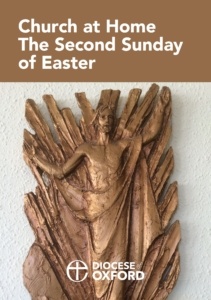 Watch the Church at Home on on the Second Sunday of Easter service here. Details of our Church at Home services, together with a listing of parish live streams can be found on the Diocesan website.
Watch the Church at Home on on the Second Sunday of Easter service here. Details of our Church at Home services, together with a listing of parish live streams can be found on the Diocesan website.

